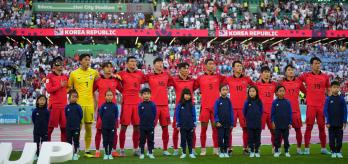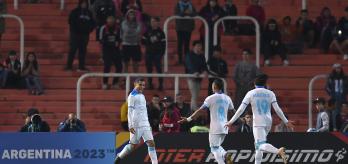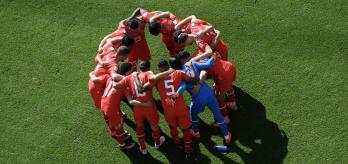Korea Republic has long been recognised as one of Asia’s strongest footballing nations, having qualified for every FIFA World Cup™ since 1986. Despite this long track record of success, the breakthrough to the very top of the world game has remained elusive. In this presentation, Jeehoon Kim explains how his association is overhauling its coaching system to address specific areas of development, emphasise traditional strengths and forge a distinctive national identity on the pitch.
Good practice
- Hard data can help you pinpoint your strengths and weaknesses in comparison to your competitors, which allows you to target specific areas for improvement.
- However, this doesn’t mean you have to imitate to succeed. Football is intrinsically linked with culture, and drawing on that culture can provide a strong foundation for a clear identity on the pitch.
- A spirit of openness and willingness to share data are crucial for making sure that all relevant stakeholders are pulling in the same direction.
Watch presentation
Read summary
Part 1: Introduction
Over the last two years, the KFA has been working to establish an overarching talent development philosophy to guide coaches and administrators at all levels of the game. The “Made In Korea” project aims to identify and overcome the obstacles that have prevented Korea Republic from bridging the gap to the world’s elite in recent years.
Part 2: The “Made In Korea” philosophy
In 2002, Korea Republic reached the semi-finals of the FIFA World Cup™ on home soil. It was hoped the Taeguk Warriors would quickly establish themselves at the top of the world game, but the breakthrough failed to materialise. To find out why, the KFA drew on data from FIFA tournaments to compare the performance of its national sides to their competitors. It also identified four key concerns for the future of the game in Korea Republic, and developed a strategy for tackling them rooted in the country’s national identity. All this work culminated in “Fast, Fearless, Focused”, an approach designed to maximise Korea Republic’s traditional strengths and encourage players to take risks on the pitch.
Part 3: The KFA game model
So, what does being fast, fearless and focused look like on the pitch? The core tenets of this philosophy are that training should be guided by local coaches, and that it should be based on realistic in-game scenarios, so that youngsters learn to handle pressure and make the right decisions when it counts. This approach is complemented by comprehensive data-sharing at all levels of Korea Republic’s football pyramid, from grass-roots clubs right up to the KFA’s new High Performance Group (which was set up with the help of FIFA’s TDS programme). This spirit of openness is key to ensuring all stakeholders are working together to take Korea Republic’s football to the next level.
Q&A
01:37
How important is collaboration with the professional league and the clubs in helping to achieve your aims?
04:36
What do you think the challenges will be as you move towards 100% alignment (i.e., making sure that every coach in Korea Republic is aligned with the programme)?
11:18
Culture is extremely important – and very hard to change. Are there any cultural barriers you have identified to the future success of the programme?









